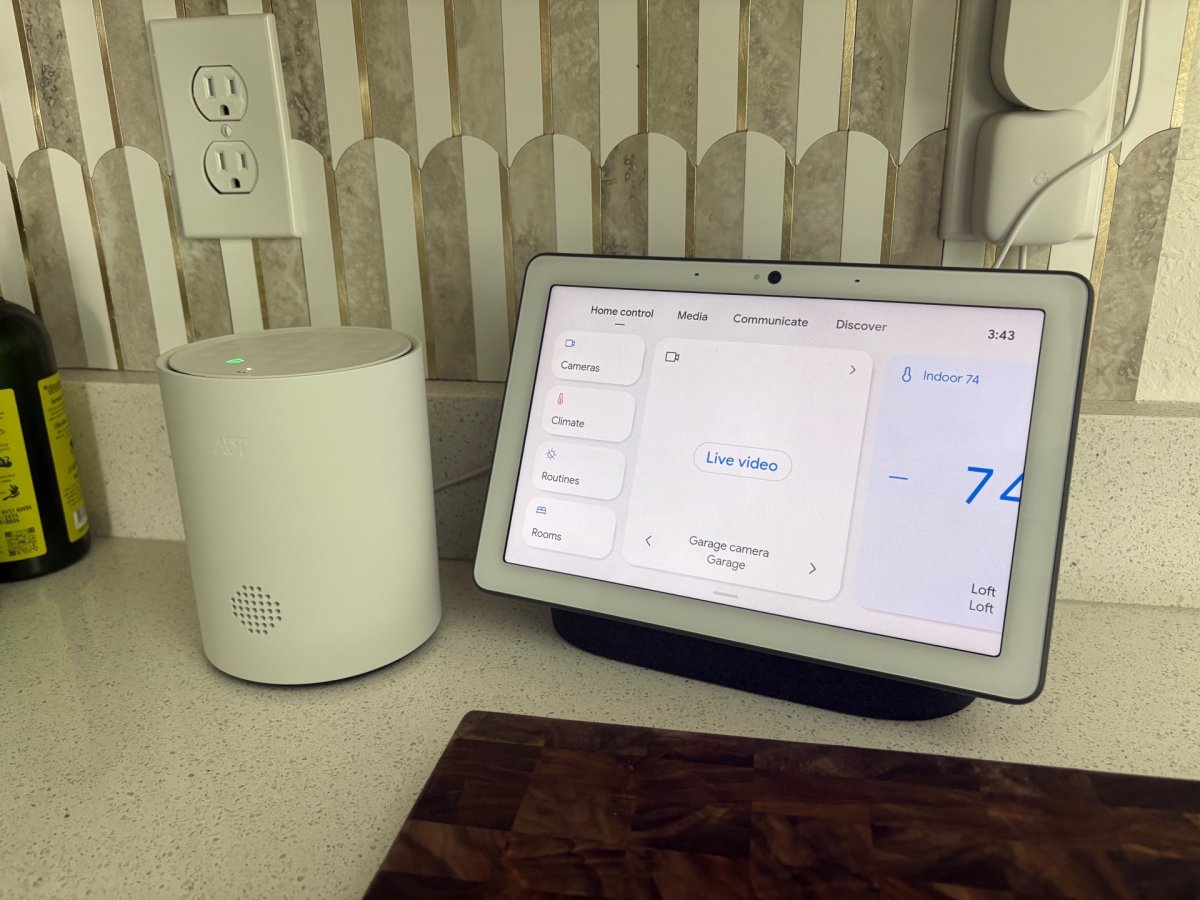
We may earn revenue from the products available on this page and participate in affiliate programs. Learn More ›
Home security systems help customers protect their possessions, investments, and families from intruders, environmental hazards, and more. Most modern systems allow customers to operate the system and monitor their property using a mobile app, which allows them to keep tabs on things even when they’re away from home. Many systems also pair with smart-home assistants like Alexa, Google Assistant, and Siri, enabling customers to sync their home security system with their smart-home system for even more control.
There is more choice than ever before when it comes to home security systems, which is a huge benefit for homeowners and renters who want to improve the security of their home. But how are customers meant to choose the best system for their home? With careful research, customers can identify the top home security companies and find the best options available for them, no matter their home security needs.
Editor’s Note: Prices listed in this article are accurate as of the last update, but may vary. For the most up-to-date costs, please see each home security company’s website.
- BEST OVERALL: ADT
↓ Jump to Review - BEST BANG FOR THE BUCK: SimpliSafe
↓ Jump to Review - BEST PRO-MONITORING: Vivint
↓ Jump to Review - BEST SELF-MONITORING: Ring
↓ Jump to Review - ALSO CONSIDER: Frontpoint
↓ Jump to Review
Home Security Systems Comparison
| Base Cost | Minimum Monthly Cost | Installation | Trial Period | Warranty | |
| ADT | $269.00 | $24.99 | Professional or DIY | 6 months | 90 days |
| SimpliSafe | $249.96 | $9.99 | DIY | 60 days | 3 years |
| Vivint | $599.99 | $39.99 | Professional | 3 days | 120 days |
| Ring | $244.95 | $4.99 | DIY | 30 days | 1 year |
| Frontpoint | $541.91 | $44.99 | DIY | 30 days | 3 years |
Our Top Picks

When considering our picks for best home security systems, we looked for companies that offered a wide range of systems for multiple budgets, different equipment options for varying needs, and warranties to help give customers peace of mind.
Best Overall
ADT
Get at ADTWhat We Like
- 6 company-owned monitoring centers
- Excellent professional installation and customer support
- Wide range of available equipment
- Relatively long money-back guarantee
- Seamless integration with Google Nest devices
- Trusted Neighbor emergency access feature
What We Don’t Like
- Potentially high early cancellation fees
- Base station is bulky and not wall-mountable
- Dual app notifications require user-side troubleshooting
Specs
- Base cost: $194.98
- Minimum monthly cost: $24.99
- Installation: Professional or DIY
- Trial period: 6 months
- Warranty: 90 days
Why It Made the Cut: ADT pairs its unmatched monitoring network with Google Nest smart home tech to offer one of the most robust and professionally supported security systems on the market today. In testing, this system detected motion within three seconds. We also noted the near-instantaneous follow up calls from ADT whenever triggering an event (such as leak detection, which our tester spilled water on).
Our Product Reviews tester and writer, Paul Rankin, had the following to say about the installation process, integration with his smart home setup, and daily use of the ADT security system.
ADT is a household name in home security, and after having the system installed in my own home, I understand why. I opted for the professionally installed package, which included a mounted Google camera for the driveway, sensors on doors and windows, and motion detectors inside the home. The process was smooth overall, though I did run into a small hiccup when connecting the main hub to Wi-Fi. It wasn’t intuitive to troubleshoot, but the issue was eventually resolved.
Since I already had a Google Nest doorbell and thermostat, integrating everything into one ecosystem was a huge plus. All devices synced up easily with the Google Home app, and ADT also layers in its own ADT+ app. The redundancy is useful for arming/disarming the alarm and managing trusted users, but I had to turn off duplicate notifications between the two apps to prevent redundant alerts.
One standout feature is the Trusted Neighbor function, which lets you grant emergency access to someone you trust—like a friend or neighbor—without giving them 24/7 entry. It’s a clever and secure failsafe in case something happens when you’re not home.
On the hardware side, I have one gripe: the ADT base station is large and not wall-mountable. Unlike the sleek wall keypads I’ve used in the past, this model takes up countertop space, which isn’t ideal in a kitchen or entryway where space is limited. I ended up placing it in the kitchen, but it feels like a missed opportunity not to offer a wall-mount option.
As for the security itself, the Google devices do the usual heavy lifting of motion detection, video capture, instant notifications, etc., but ADT+ sets itself apart with its 24/7 professional monitoring. I accidentally triggered the alarm a couple of times during the first month, and they called instantly to check in. That rapid response adds real peace of mind. The system also comes with a dedicated panic button remote, which can instantly alert emergency services when two buttons are pressed at once—perfect for bedside use at night.
Perhaps most impressive was the care from the installation pro, who spent a solid 30 minutes post-installation walking me through every part of the system. That kind of service makes a big difference, especially for less tech-savvy users.
All in all, I’m very happy with ADT+ so far. I just wish that base station had a wall-mount option. It’s a small thing, but one that matters in a well-designed home.
Get ADT home security at ADT.
Best Bang For The Buck
SimpliSafe
Get at SimpliSafeWhat We Like
- Wide range of equipment packages available
- Relatively affordable monitoring plans
- Limited lifetime warranty available to subscribers
What We Don’t Like
- Somewhat limited range of security devices
- Current outdoor camera requires an upgraded plan
- Relatively limited smart home compatibility
Specs
- Base cost: $250.96
- Minimum monthly cost: $9.99
- Installation: DIY or professional
- Trial period: 60 days
- Warranty: 1 year
Why It Made the Cut: An affordable option with a long standard warranty and various service levels to fit different household needs, SimpliSafe is one of the best DIY home security systems. In testing, its customizable entry delay was practical for daily use, and when we triggered an alarm, the system responded promptly with text and phone follow-ups before escalation. We did notice a brief delay in camera recording, but alerts were fast and footage still captured a visitor’s full approach.
SimpliSafe is one of the best-known names in DIY security systems, and for good reason. The company offers a wide range of security equipment options spread over seven preset equipment packages, so customers can readily find a setup that works for their particular needs. The popular entry-level Starter package includes a base station, keypad, three entry sensors, and a motion sensor. Additional add-ons are also available. SimpliSafe security devices include cameras, video doorbells, smart locks, water sensors, smoke detectors, and panic buttons, though the lineup lacks devices like a garage door sensor, touch-screen keypad, or wired outdoor camera.
While SimpliSafe is compatible with systems like Amazon Alexa and Google Home, customers looking for a system that integrates easily with their current smart-home setup may find this functionality to be quite limited. SimpliSafe’s equipment packages range in price from $250.96 to $733.90, and the company often offers even lower promotional prices. SimpliSafe products come with a 1-year warranty on hardware, which extends up to a limited lifetime warranty for customers who sign up for and maintain an uninterrupted subscription to Pro Plus, Pro, or Core monitoring plans that start within a year of purchase.
One of the best aspects of a SimpliSafe home security system is that it offers the best of both worlds—customers can do a DIY install or opt for professional installation if they prefer. Regardless of installation method, they can take advantage of professional monitoring services with five monitoring plans or the unmonitored option, offering a wide range to meet your needs and budget.
Aside from self-monitoring for $10 per month, the standard monitoring plan is the most affordable option SimpliSafe offers at $0.76 per day or about $23 monthly. It includes 24/7 police, fire, and medical monitoring and dispatch, so customers can get authorities to their home quickly in the event of an emergency. It also comes with up to a 1-year warranty and HD live view on all cameras—just no camera recordings. For only $1.10 per day (around $33 per month), the popular Core professional monitoring service that we tested includes features like smart-home integration, arming reminders, and a lifetime equipment warranty. SimpliSafe has a self-monitoring plan that costs $0.33 per day (around $10 per month). Newer plans feature evening (8 p.m. to 6 a.m.) or 24/7 professional monitoring to detect, engage with, and ultimately deter possible intruders via alarms and spotlights.
What Our Tester Says: “Since we installed a slightly modified Foundation kit with SimpliSafe’s Core monitoring plan 2 years ago, we’ve had the peace of mind that we could monitor water leaks, smoke alarm alerts, package drop-offs, and potential break-ins even when away from the house. We know when deliveries occur and cat sitters check in with their unique codes—even in the case of a power outage, thanks to a battery backup. My only disappointment was that its video doorbell isn’t the most sophisticated in distinguishing alerts about who or what is in the path, but it’s still fairly reliable for the price of the plan.”—Kathleen Corlett, Editor in Chief and Product Tester
Get the SimpliSafe home security with monitoring at SimpliSafe.
Get the 5-Piece Home Security System at Amazon.
Best Pro-Monitoring
Vivint
Get at VivintWhat We Like
- Standard intruder-deterrent camera technology
- Standard cellular ratio and battery backup
- Wide range of equipment options
- Custom rules and specific user permissions available
What We Don’t Like
- Relatively expensive equipment
- Relatively short trial and warranty periods
Specs
- Base cost: $599.99
- Minimum monthly cost: $39.99
- Installation: Professional
- Trial period: 3 days
- Warranty: 120 days
Why It Made the Cut: Vivint security systems are professionally installed and monitored and offer flexible equipment packages, unique intruder-deterrent technology, and simple smart-home control.
Vivint offers four preset equipment packages for customers to consider. The entry-level Core Home Security package includes a Vivint Smart Hub Control Panel, four entry sensors, and one motion sensor. The other packages add different types of cameras to the core bundle: an indoor camera, a doorbell camera, or an outdoor camera. Customers can choose the package that best fits their needs and add more devices to their system as they determine additional priorities for their home’s security.
The ability to expand a home security system can be helpful for homeowners who find that the 3-day trial period doesn’t provide enough time to determine what their ideal setup should look like. Users can also set up custom rules to automatically arm and disarm the system, lock and unlock doors, and change thermostat settings. In addition, customers can set specific user permissions to allow certain people to perform actions from their Vivint app, such as locking or unlocking doors or accessing security camera feeds.
Packages range in cost from $599.99 to $999.99—a relatively high price, though financing is available for those who can’t cover Vivint pricing up front. Monthly payments for those who finance can range from $17 to $36 and vary depending on the length of the financing contract.
Although Vivint doesn’t offer a self-monitoring option, the company’s professional monitoring plan may be worth the cost ($39.99 per month) for customers who prefer to leave their home’s security in the hands of professionals. If an alarm is triggered, customers will receive alerts via the mobile app, and Vivint’s support team will reach out to the customer to determine whether help is needed. If there’s no response, the support team will send first responders to check on the home.
The Vivint Smart Hub, which comes with every security system, has several notable features. These include two-way talk, live and recorded video streaming, and the ability to control all smart devices in the home. The hub is always connected with cellular radio and a backup battery, so customers don’t have to worry about losing connection if there’s a power outage. The company’s cameras include Smart Deter technology, which will play a loud noise and illuminate the camera’s LED ring light if it detects a person lingering in the vicinity of the home for too long. This feature can help deter intruders before they even make it to the front door, while also providing customers with peace of mind that their home is protected.
A Vivint home security system is protected by a 120-day warranty, but customers can extend that period by subscribing to the Vivint Protection Plan for an additional monthly charge. That plan remains in place as long as the customer pays the subscription fee, and it covers on-site repair, free replacements of faulty equipment, shipping costs, and coverage for equipment damaged by power surges.
Get Vivint home security at Vivint.
Best Self-Monitoring
Ring
Get at RingWhat We Like
- Relatively low up-front and monthly costs
- DIY or professional monitoring options
- Neighborhood security app available
What We Don’t Like
- Subscription required to access certain features
- Potential security concerns
Specs
- Base cost: $244.95
- Minimum monthly cost: $4.99
- Installation: DIY or professional
- Trial period: 30 days
- Warranty: 1 year
Why It Made the Cut: With cutting-edge technologies, consistent new product releases, and relatively low prices, Ring has positioned itself as one of the best and most affordable home security companies.
Ring is best known for its video doorbell, but the company offers a wide range of additional security products at a relatively low price. Customers can opt for a starter kit for as little as $199.98, and they can add on extra products like doorbells, cameras, floodlights, and smoke/carbon monoxide detectors. A Ring doorbell costs $99 on average, while the cheapest Ring subscription costs $4.99 per month or $49.99 per year. This plan includes video recording for one camera, which may be plenty for some homeowners.
Customers with multiple Ring home security system devices can opt for the Plus plan for $10 per month or $100 per year, which provides video recording for all Ring devices within the home. The Ring Protect Pro service is $20 per month or $200 per year, and it includes professional monitoring and Alexa Guard Plus in addition to features like 60-day video history and person alerts. Ring products are designed for DIY installation, but professional installation services are available through OnTech.
There have been past reports of Ring providing this footage to law enforcement without customer consent and storing sensitive customer data on an unencrypted cloud server, so customers might be wary about adding a Ring camera to their home. However, Ring’s parent company, Amazon, has committed to doing better, which can be reassuring to potential customers.
On the positive side, customers who have Amazon Alexa devices in their home will find it easy to connect Ring devices to create a comprehensive smart-home experience. Ring works with Google Home to an extent as well, though not quite as seamlessly. Customers can control their Ring devices through the Ring – Always Home app, as well as communicate with visitors through video doorbells or cameras. Ring offers an additional app called Neighbors by Ring, which allows the user to connect with other Ring users in their neighborhood to communicate safety alerts and other information about suspicious activity neighbors have reported in their neighborhood.
Get Ring Home Security at Ring.
Also Consider
Frontpoint
Get at FrontpointWhat We Like
- Standard hourly automatic system checks
- Relatively long standard warranty
- Simple smart-home integration
What We Don’t Like
- Relatively high monitoring costs
- Cheaper monitoring plans not offered online
Specs
- Base cost: $541.91
- Minimum monthly cost: $44.99
- Installation: DIY or professional
- Trial period: 30 days
- Warranty: 3 years
Why It Made the Cut: Frontpoint offers a system that customers can easily install themselves, along with 24/7 professional monitoring from a team of trained experts. Customers also receive a long warranty and can easily integrate their Frontpoint system with their existing smart-home system.
Frontpoint’s name isn’t as recognizable as some of the other names in the home security industry, like ADT or Ring, but the brand has set itself up to be a major competitor in this space. Frontpoint doesn’t require a long-term contract, but it only offers professional monitoring as a full-service home security solution (no self-monitoring). Frontpoint monitoring service starts at $44.99 per month for a system without cameras, or $49.99 for a home security system with cameras, which is relatively expensive. Video-only plans may be available starting at $14.99, but customers can opt for this plan only by calling and speaking to a rep—those who order online will be required to pay for one of the more expensive plans. Monitoring includes 24/7 support, fast response times, hourly automatic system checks, an emphasis on privacy and security, and a number of other perks like alerts, sensor history, and video history.
Frontpoint offers a variety of different equipment solutions for different levels of security needs—and customers have the option of building their own packages if the preselected ones don’t suit their needs. Equipment is designed for DIY installation, but customers who prefer to leave it to the pros can schedule an appointment through HelloTech to have their system professionally installed for $99.
Frontpoint is also compatible with security devices from other companies, so users with their own security equipment can still opt for Frontpoint’s services. It’s also easy for customers to integrate their Frontpoint system with smart-home systems such as Amazon Alexa and Google Assistant. Homeowners may appreciate the long 3-year warranty in case their system breaks down or malfunctions and requires a repair or replacement. Finally, Frontpoint performs hourly automatic system checks, which ensure that customers’ devices don’t die or get disconnected for extended periods.
Get Frontpoint home security at Frontpoint.
Jump to Our Top Picks
How We Chose the Best Home Security Systems
When determining the best security systems for homes, we looked at several factors, but we placed the most weight on each potential candidate’s product releases and the brand’s ability to keep pace with recent technology. We evaluated these systems based on their pricing, fees, packages, plans, and monitoring services. We also took into account their home automation and device compatibility, reputation and customer reviews, installation options, and whether they offered a trial period or warranty (and if so, for how long).
Choosing the best home security systems requires a balance—finding which system offers the best performance for each individual situation without that system being overpriced or lacking in other key areas like security, installation options, or customer service.
What to Consider When Choosing a Home Security System

There are several factors for customers to consider when wondering what to look for in a home security camera system. When shopping for a security system for home use, it’s a good idea for customers to consider the cost of the home security system, the installation process, the equipment they’re getting for the price, the cost of monitoring or subscription fees, and any additional details like warranties and cancellation fees.
Which Type of Buyer Are You?
Every household has different priorities, so identifying your buyer profile can make choosing a home security system much easier. These quick personas help clarify which features matter most.
- If you have pets: Look for pet-immune motion sensors, indoor cameras with configurable activity zones, and AI-powered false-alarm reduction. These features reduce unnecessary alerts caused by animals moving around the home.
- If you rent: Wireless, peel-and-stick sensors and fully DIY systems are your best bet. Avoid hardwired or professionally installed systems that could violate lease terms or be difficult to remove when you move out.
- If your home is large or multi-story: Prioritize systems with extended-range sensors, mesh Wi-Fi support, and multi-camera bundles. Larger homes benefit from more robust coverage to avoid blind spots.
- If you travel frequently: Choose a system with 24/7 professional monitoring, cellular backup, and real-time smart alerts. Integrations with smart locks, lights, and video doorbells can also help mimic activity at home.
- If you’re tech-savvy: Look for systems with advanced app control, smart-home integrations, automation routines, and compatibility with platforms like Alexa, Google Home, or Apple Home.
- If you’re on a budget: Opt for DIY-friendly kits with lower-cost self-monitoring plans. Brands like SimpliSafe and Ring tend to offer the most affordable entry points without sacrificing essential protection.
Reputation and Customer Reviews
It’s almost impossible for a customer to know for sure whether a system will be a good fit until it’s actually been put to use. Customers may struggle to decide which company is right for them, especially if they have narrowed it down to two good options like Vivint vs. Ring or SimpliSafe vs. ADT.
In general, household-name companies that have been in the home security space for a while tend to be reliable. The company’s reputation and customer reviews can be a good way for customers to get the information they need before making a purchase. Reading home security system reviews on sites such as Trustpilot or the Better Business Bureau (BBB) may provide customers with some insight, though they may disproportionately represent customers who have had negative experiences. Many trustworthy sites include security system reviews that weigh the pros and cons of popular systems and can address common concerns. Customers can also ask their neighbors and friends how they like their security systems to get an honest assessment.
Equipment Options and Quality
A basic home security system comes with a control panel and one or more entry and motion sensors. But many home security companies offer a much wider variety of equipment, ranging from indoor and outdoor security cameras to flood and smoke detectors. Customers will want to determine the type of equipment they want in their system and make sure their chosen company has the right options.
In addition, customers will want to consider the quality of the home security equipment. Some companies produce their own equipment, while others partner with third parties for their cameras or hazard sensors. Customers can check the specs of each piece of equipment to determine alarm volume, video quality, and other factors worth considering. Ultimately, a customer will want to ensure they’re choosing the best home security camera and other equipment for their home.
Packages and Plans
Most home security companies offer equipment packages that customers can purchase to meet their basic home security needs, and from there, customers can add equipment to build their ideal system. While some companies may offer two or three equipment packages, others may offer five or more. Customers will want to make sure they’re getting the appropriate equipment to fully protect their home. It’s wise to determine how many security cameras they need to narrow down potential equipment packages.
Security companies may also have different monthly monitoring plans and options to consider. Some may offer a choice between DIY monitoring and professional monitoring, while others may offer one or the other. Customers will want to determine what type of monitoring plan they want and find the one that works best for them.
Pricing and Fees
A home security system has several types of fees for customers to consider. First, there’s the up-front cost of the equipment. Security companies may offer financing options or they may require customers to pay for their equipment in full. Customers will want to consider their preferences alongside their budget and ensure the security company they choose has the options they want.
In addition to the equipment, customers will need to consider monthly monitoring fees. Most home security companies charge a monthly subscription fee, whether a customer opts for professional monitoring or self-monitoring. Customers will want to determine how much they can afford to pay each month, as well as what type of monitoring they prefer, and look for a company that suits their needs and budget.
Installation
While some home security systems can be installed by a customer who knows how to install security cameras, others will require professional installation. Even with systems that can be installed by the customer, some homeowners prefer having an experienced professional on site to decide where to place security cameras or show them how the system operates.
Mike Silva, owner and principal consultant at Silva Consultants, a Seattle-based security consulting firm, advises that “DIY equipment…can work well in basic applications such as apartments and small homes. Professionally installed systems offer a far wider range of devices that can be used and are usually best for larger homes or when there is a need for more sophisticated types of intrusion-detection devices.”
Companies like SimpliSafe and Frontpoint are ideal for those who want to install their own equipment, while brands like ADT and Vivint are good choices for customers who don’t mind paying security camera installation costs.
Monitoring
Some home security systems will offer customers the choice between professional monitoring and self-monitoring, while others may only offer one or the other. A customer who works from home and is tech-savvy may prefer a self-monitoring system for a lower monthly price. However, with professional monitoring, the customer has a team of experts available 24/7 to assist in the event of an emergency. Homeowners will want to determine which option is best for their circumstances before choosing a home security system.
According to Silva, “If the home has a monitored fire alarm system and catches fire, it is far better to have a monitoring center call the fire department immediately than hope that the homeowner receives the notification and can quickly take action.” With self-monitoring, the customer will be responsible for calling 911 if an emergency occurs. Professional monitoring is typically more expensive than DIY monitoring, but generally promotes added safety and a sense of security, which makes the home security system more effective, as well as giving customers greater peace of mind.
App User Experience
While it may not be the first factor that comes to mind when a customer is choosing a security system, it’s wise for them to consider a company’s app in addition to the rest of the system. An app that has a poor user interface or functionality will be a huge inconvenience and even a safety hazard. Potential new customers can check ratings and reviews in the app store to get an idea of existing customers’ experiences.
Contracts and Trial Period
Some companies offer a trial period of their professional monitoring services for a limited amount of time so customers can test out the service before committing. Others may offer a trial period on their equipment, allowing customers to test out the products in their home to ensure they’re the best fit. Customers will want to read the fine print on these trial periods and understand the monthly fees they may be charged once the trial has ended. To compare SimpliSafe vs. Ring, SimpliSafe offers a 60-day money-back guarantee, whereas Ring’s guarantee lasts only 30 days. Some brands offer 90 days, while others offer 3 years or longer.
Depending on the home security company, customers may find themselves locked into a contract that lasts several years. This can be a good thing or a bad thing—some people prefer to avoid contracts so they can switch companies at will. Others may prefer the stability offered by a contract and may also prefer to finance their equipment over several years rather than paying up front.
Warranty
With security systems for home use, there is a wide range in the warranty time period between companies. However, according to Silva, “Most equipment manufactured these days is quite reliable, and if it survives the warranty period, will probably last for many years thereafter.”
The details of a warranty matter, too. Does the warranty cover manufacturing defects pertaining to equipment, or does it cover all the equipment and the installation as well? This information is just as important as the warranty time frame, so customers will want to ask the company for more details about its warranty if it isn’t clearly advertised.
Home Automation and Device Compatibility
With smart-home devices increasing in popularity, more homeowners are looking for a security system that is compatible with their other frequently used devices. Many security systems also offer smart-home equipment that can be added to systems. Some common additions include thermostats, lighting, and garage door openers. These features make it possible for residents to control parts of the home remotely; for example, turning lights on and off or changing the temperature.
Before You Install a Home Security System
A good home security system serves as a deterrent, with yard signs that serve as a warning, sensors that alert customers to motion and breaking glass, different types of window alarm sensors to detect intruders as they enter the home, and monitoring services that can help get the police or fire department to the home as soon as possible in the event of an emergency. It’s essential that customers get everything they want and need in their chosen home security system.
Before shopping for a system, customers can list out their must-have features or equipment requirements, whether they’ll require professional installation, and whether professional monitoring or self-monitoring is a better fit. If the choice comes down to Frontpoint vs. SimpliSafe, knowing that the customer prefers DIY monitoring and only SimpliSafe offers this option will make their decision easier. Customers will also want to consider whether a wired or wireless security camera system will work best for their home. This will help narrow down the search and ensure that the system the customer chooses provides as much protection as is necessary.
Unfortunately, hacking can be a risk for security system owners, although it is rare. Before setting up the system, customers will want to take precautions such as choosing strong Wi-Fi passwords and setting up two-factor authentication. They will also want to remember to avoid accessing the system from a network other than the home’s private Wi-Fi, as public networks are more vulnerable to hacking than secured ones.
Cost of Buying a Home Security System
While some will prefer the ease of use associated with a system like Vivint, others will prefer the added flexibility, DIY installation, and affordability they can get with a brand like Ring or SimpliSafe. Weighing these benefits and costs is the key to finding the best home security system for each individual customer. On average, a home security system costs $700, but that cost is heavily dependent on a number of factors such as monitoring, installation fees, number of equipment pieces, and others. The costs could easily be lower or higher than the average, depending on the specific home security setup. Customers could pay as little as $280 or as much as $1,150 for the average home security system.
If costs are a concern, customers may want to ask a representative from the security company about leasing or financing options to create a cheap home security system. Many popular brands allow customers to finance their payments over the course of months or years. Others offer the option to purchase the system gradually, adding equipment at a discounted price at their convenience.
It’s also worthwhile for customers to ask if any discounts are available, as deals and promotions are common for home security companies (especially around holidays and national sales events such as Black Friday).
The Advantages of Home Security Systems
A home security system is both a preventive mechanism and an investigative tool. Yard signs let intruders know that the homeowner or renter has a security system, and the presence of home alarms may also help deter a possible intruder. Smoke and carbon monoxide (CO) detectors can help prevent devastating events resulting from fires or leaking CO gas. Ultimately, investing in the right home security system for a customer’s needs is worth the cost.
Choosing one of the best home security systems is an investment in the customer’s home, their peace of mind, their mental health, and their physical safety. When a homeowner or renter has a home security alarm system, especially a reliable system, it provides a sense of comfort and makes them feel safer overall. The best home security systems offer the following benefits.
- Deterrent for home intruders, or evidence of an intrusion for an official police report;
- A sense of safety and peace of mind for customers who can feel that their homes are more secure; and
- A relatively affordable cost for the amount of available features and ever-evolving technology.
FAQs
Customers who are still going back and forth between two or more options may find it encouraging to know that many people see benefits in more than one home security company. Before choosing the best home security system for them, homeowners and renters can consider several frequently asked questions to help them reach their decision.
Most home security starter systems come with a keypad, motion sensors, and a hub at minimum. Some systems may include additional products like key fobs, panic buttons, indoor and outdoor cameras, video doorbells, smoke detectors, carbon monoxide (CO) detectors, or glass-break sensors. Some of the best home security system companies also offer home automation equipment so customers can conveniently manage their home security and smart devices from one app.
Systems with UL-certified equipment meet rigorous safety and performance standards established by Underwriters Laboratories for alarm system installation and monitoring. According to UL certification standards, professionally installed systems must pass extensive testing under various environmental conditions to ensure reliable operation during emergencies.
It’s advised for homeowners and renters to avoid posting their absence on social media, as this lets potential intruders know their house will be empty for a certain time period. According to FBI burglary data, approximately 750,000 burglaries occurred in the United States in 2024, with research showing that homes without security systems are 300 percent more likely to be targeted by burglars.
Residents will want to set their alarm system and place cameras at entrance points to catch any potential intruders.
Finally, it’s advised that residents let their neighbors know that they will be gone so they can have extra eyes on their home while they are out of town (and so they can pick up their mail so it doesn’t pile up and clue in intruders to the resident’s absence).
Taking advantage of security features like two-factor authentication can make a big difference. Additionally, it’s wise for customers to make sure they’re changing their password regularly, using strong passwords, using guest networks (instead of allowing guests on their regular network), and taking advantage of a password vault application.
Systems that comply with UL security standards undergo testing for communication protocols and backup power requirements to minimize vulnerabilities.
With self-monitoring, customers can contact the authorities if they see something suspicious or dangerous happening. Customers with professional monitoring will have their provider contact the authorities if their alarm goes off (provided it’s not a false alarm). There are benefits and drawbacks to both monitoring options, and customers will want to take into account their personal preferences and budget before deciding on the best monitoring option for them.
Yes, homeowners can potentially get a discount on their insurance premium of as much as 20 percent with a home security system. However, according to insurance industry research, most homeowners receive discounts in the range of 2 to 15 percent, with the typical discount falling between 2 and 10 percent depending on the system features and insurance provider.
Systems with professional monitoring and UL certification typically qualify for higher discounts because insurance companies recognize these meet established safety standards. The Insurance Information Institute recommends checking with your insurance provider before installing a security system to ensure the discount justifies the investment. To find out exactly how much they could save on their homeowners insurance premiums, homeowners are encouraged to reach out to a representative from their insurance provider.
According to the National Fire Protection Association (NFPA), smoke alarms cut the risk of dying in a home fire in half. NFPA research shows that having any type of smoke alarm reduces fire-related deaths by at least 30 percent, and this improves to 71 percent in homes with hardwired smoke alarms that have battery backup.
Many comprehensive home security systems include monitored smoke detectors that automatically alert emergency services, giving you an extra layer of protection beyond standard battery-operated alarms. The NFPA recommends installing smoke alarms on every level of the home, inside every bedroom, and in hallways near sleeping areas.








